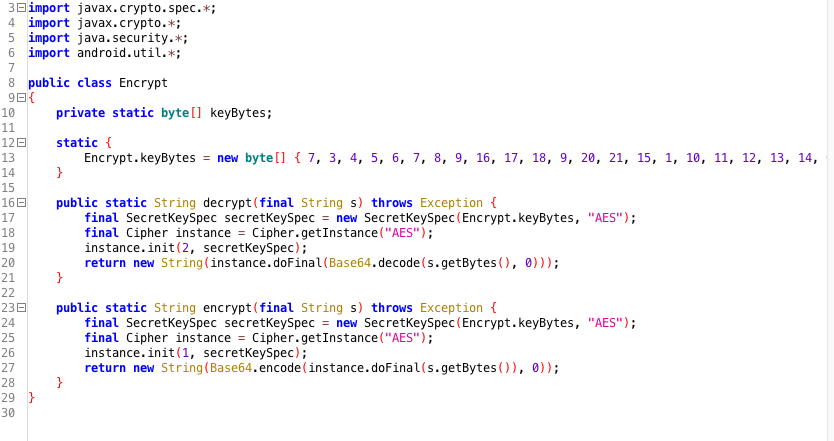MASTG-TEST-0013: Testing Symmetric Cryptography
Deprecated Test
This test is deprecated and should not be used anymore. Reason:
Please check the following MASTG v2 tests that cover this v1 test:
Overview¶
Static Analysis¶
Identify all the instances of symmetric key encryption in code and look for any mechanism which loads or provides a symmetric key. You can look for:
- symmetric algorithms (such as
DES,AES, etc.) - specifications for a key generator (such as
KeyGenParameterSpec,KeyPairGeneratorSpec,KeyPairGenerator,KeyGenerator,KeyProperties, etc.) - classes importing
java.security.*,javax.crypto.*,android.security.*,android.security.keystore.*
Check also the list of common cryptographic configuration issues.
For each identified instance verify if the used symmetric keys:
- are not part of the application resources
- cannot be derived from known values
- are not hardcoded in code
For each hardcoded symmetric key, verify that is not used in security-sensitive contexts as the only method of encryption.
As an example we illustrate how to locate the use of a hardcoded encryption key. First disassemble and decompile ( Decompiling Java Code) the app to obtain Java code, e.g. by using jadx.
Now search the files for the usage of the SecretKeySpec class, e.g. by simply recursively grepping on them or using jadx search function:
grep -r "SecretKeySpec"
This will return all classes using the SecretKeySpec class. Now examine those files and trace which variables are used to pass the key material. The figure below shows the result of performing this assessment on a production ready application. We can clearly locate the use of a static encryption key that is hardcoded and initialized in the static byte array Encrypt.keyBytes.

Dynamic Analysis¶
You can use Method Tracing on cryptographic methods to determine input / output values such as the keys that are being used. Monitor file system access while cryptographic operations are being performed to assess where key material is written to or read from. For example, monitor the file system by using the API monitor of RMS Runtime Mobile Security.